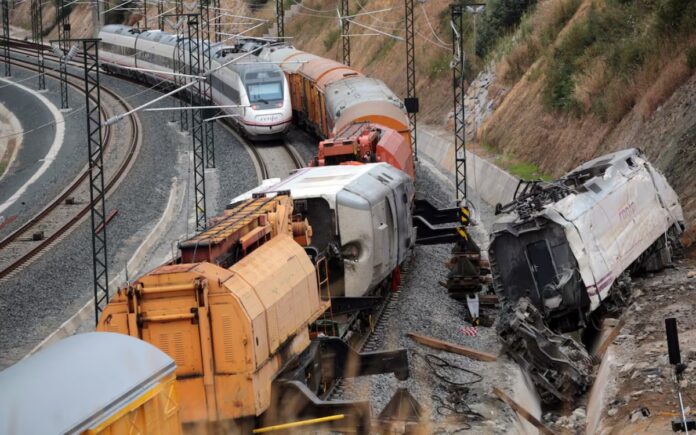Madrid: A Spanish train driver and a former traffic safety chief at ADIF, Spain’s national rail infrastructure operator, were sentenced on Friday to two-and-a-half years in prison for their roles in a catastrophic train disaster that claimed 79 lives and injured 143 others 11 years ago.
The eight-carriage, high-speed Alvia 04155 train derailed on a sharp bend near Santiago de Compostela, crashing into a concrete wall and erupting in flames. This tragic event marked Spain’s worst rail accident in decades.
Presiding Judge Elena Fernandez Curras identified two critical factors leading to the derailment: the driver’s distraction due to a phone call and the absence of a crucial safety system to enforce speed limits.
“The driver’s attention was diverted at a critical moment,” stated Judge Fernandez Curras, emphasizing the need for robust safety measures to prevent such tragedies.
In addition to the prison sentences, the court ordered the defendants and the insurance companies of ADIF and Renfe to pay 25 million euros ($27.14 million) in damages to the victims and their families.
Following the crash, ADIF conducted a thorough review of the Spanish railway network, identifying over 300 locations where speed adjustments were necessary to enhance safety.
The judicial investigation into the crash was protracted and intricate, taking several years to complete, with the trial itself lasting 10 months. Despite over 20 individuals being investigated, only two were ultimately prosecuted.
Also Read | India’s Foreign Exchange Reserves Hit All-Time High of $670.86 Billion
Judge Fernandez revised the official death toll from 80 to 79, attributing the death of one passenger, who succumbed weeks later, to a pre-existing illness rather than injuries sustained in the crash. Nonetheless, his relatives will receive compensation due to his injuries in the accident.
This conviction serves as a stark reminder of the importance of stringent safety protocols and vigilant oversight in preventing future railway disasters.



